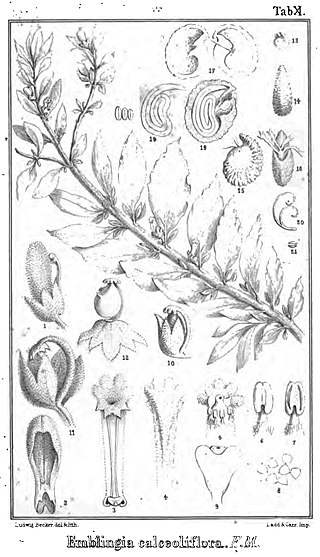
Emblingia is a monospecific plant genus containing the species Emblingia calceoliflora, a herbaceous prostrate subshrub endemic to Western Australia. It has no close relatives, and is now generally placed alone in family Emblingiaceae.
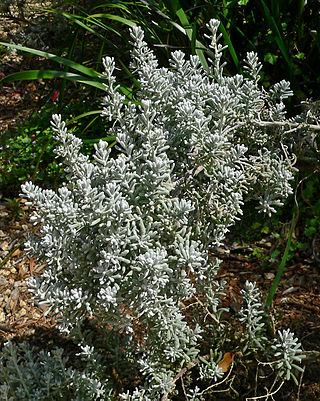
Maireana is a genus of around 57 species of perennial shrubs and herbs in the family Amaranthaceae which are endemic to Australia. Species in this genus were formerly classified within the genus Kochia. The genus was described in 1840 by the botanist, Moquin-Tandon and named to honour Joseph François Maire (1780-1867), an amateur botanist who befriended him during the author's first visit to Paris in 1834.
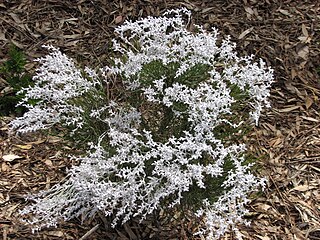
Conospermum stoechadis, commonly known as common smokebush, is a shrub endemic to Western Australia.

Stirlingia simplex is a species of flowering plant in the family Proteaceae. It is endemic to Western Australia.
Atriplex bunburyana, commonly known as silver saltbush, is a species of saltbush endemic to Western Australia.

Hypocalymma xanthopetalum is a species of shrub in the myrtle family Myrtaceae, endemic to the south west region of Western Australia.
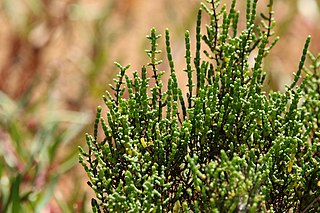
Tecticornia halocnemoides, commonly known as shrubby samphire or grey glasswort, is a species of succulent, salt tolerant plant endemic to Australia. It grows as a spreading or erect shrub up to fifty centimetres high. It was first published as Arthrocnemum halocnemoides in 1845, but transferred into Halosarcia in 1980, and into Tecticornia in 2007.

Gahnia trifida, the coastal saw-sedge, is a tussock-forming perennial in the family Cyperaceae, endemic to southern Australia.
Nicotiana occidentalis subsp. hesperis is a short-lived herb native to Australia.
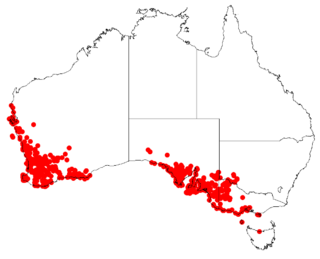
Podotheca angustifolia, commonly known as sticky longheads, is a species of herb native to Australia.
Senecio glossanthus is an annual herb native to Australia. In Western Australia it is commonly known as slender groundsel.

Trichodesma zeylanicum, commonly known as Northern bluebell, camel bush or cattle bush, is a herb or shrub native to Australia.
Granitites intangendus is a species of flowering plant endemic to Western Australia. It is found on granite outcrops in semi-arid regions of the midwest and south.

Chamaexeros is a genus of tufted perennial herbs in the family Asparagaceae, subfamily Lomandroideae.

Chamaescilla corymbosa, commonly known as blue stars, blue squill or mudrurt, is a tuberous perennial herb species in the genus Chamaescilla. It is endemic to southern Australia.

Adenanthos detmoldii, commonly known as Scott River jugflower or yellow jugflower, is a species of shrub in the family Proteaceae. It is endemic to the south-west of Western Australia.

Ecdeiocolea monostachya is a species of grass-like plant in the family Ecdeiocoleaceae native to Western Australia. It was first described by Mueller in 1874. It is a perennial herb which grows in tufts 0.4 to 1 m high and 1 m (3.3 ft) wide. It is found in yellow sands over laterite in Western Australia.

Aluta is a genus of small shrubs in the family Myrtaceae. Species occur in Western Australia, South Australia and the Northern Territory. When the genus was erected in 2000, three species were transferred from the genus Thryptomene.

Codonocarpus is a small genus of shrubs or small trees in the family Gyrostemonaceae.
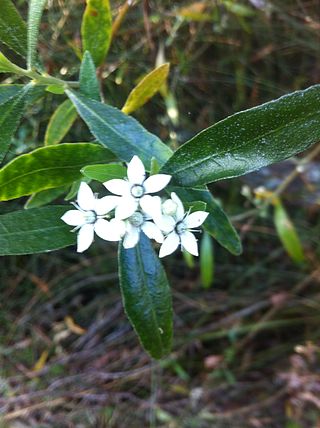
Rhadinothamnus anceps, commonly known as blister bush, is a shrub belonging to the genus of Rhadinothamnus, which is endemic to Western Australia.
















